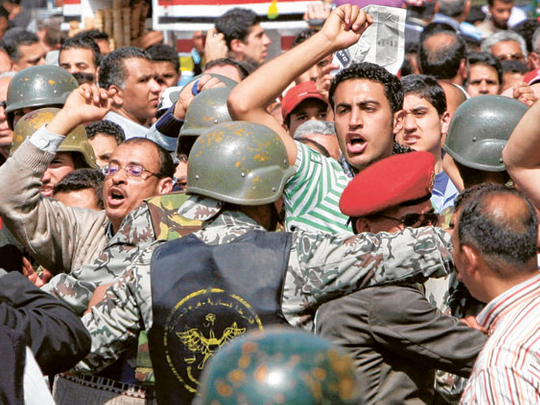
Despite the lapse of a year-and-a-half since the eruption of the popular revolutions in many Arab countries, some still cast doubts that these revolutions are driven by foreign forces and are not spontaneous reactions by Arab masses, who revolted against tyrannical regimes.
These doubts are baseless and amount to conspiracy theories. They reflect disbelief in the ability of Arab masses to revolt against their autocratic regimes. Not only ordinary people but also some highly educated people believe in conspiracy theories that the Arabs’ enemy is behind these revolutions, trying to wreak havoc in the region. This theory undoubtedly belittles the Arab masses and limits their role to being mere tools in the hands of western powers, which seek to destabilise the Arab region.
Those who cast doubts can’t believe that the young people are the ones behind mass demonstrations that have swept the Arab world, and that they are still demanding change.
But it is not surprising that the youth, who have the modern tools of communication and networking with the outside world, have managed to achieve what the older generations failed to.
They succeeded in leading masses in many Arab countries and, moreover, they have gone beyond all our expectations.
They made the use of technology to organise street protests and address the outside world in the language it understands.
We must acknowledge the superiority of today’s generation, which inherited our false values but refused to accept them after realising they would only lead to more humiliations.
The Arab youth sought to realise their dreams of dignity, freedom and social justice. They went further by demanding the end of their ruling regimes and a comprehensive restructuring of the old system. Most revolutions began peacefully, with the young protestors adopting a peaceful revolutionary approach and only demanding reforms. Yet, the stubbornness of ruling regimes, which denied their demands, prompted the revolutionaries to ask for more.
There were many reasons behind the outbreak of the revolutions. The youth have been suffering from unemployment, injustice, oppression, and this led many of them to immigrate from their countries in “coffin boats”, sailing across the Mediterranean Sea to an unknown world, risking their lives in the course of the journey.
Those who were not able to immigrate tried to bring about change under the banner of reform. But their demands were denied and the prevailing political and social culture across most Arab countries prohibited them from expressing themselves in public, and engaging meaningfully in civic and political activity. Young Arab talent has been wasted for the most part in recent history. But this is now starting to change, after people took the initiative to change their status.
The explosion of youth anger and determination to change their world were the impetus for the revolutions across the Arab world.
The current revolutions will undoubtedly unleash enormous energy and talent that have been bottled up in the minds, bodies and spirits of the youth across the region.
Arab youth initiated this historic transformation across the Middle East because they had always carried within them the determination to break free of the constraints that their societies and their governments had imposed on them for so many decades.
The young people are the ones who lead today’s battle and will definitely win it since they have the will and determination, while the older generations must acknowledge the superiority of the young and accept their leadership in thisbattle for change.
We, the older generation, should admit our mistakes and give way to the youth before it is too late and give the younger generation their right to lead Arab societies towards a better future and catch up with the modern world.
It is true that the senior generation do not have the tools and the will for change that can help advance the Arab nation. History reminds us that they earlier failed, and do not have the ability to do it now.
Hence, the older generation must pass the torch on to the youth.
Dr Khalifa Rashid Al Sha’ali is an Emirati writer who specialises in legal affairs.










